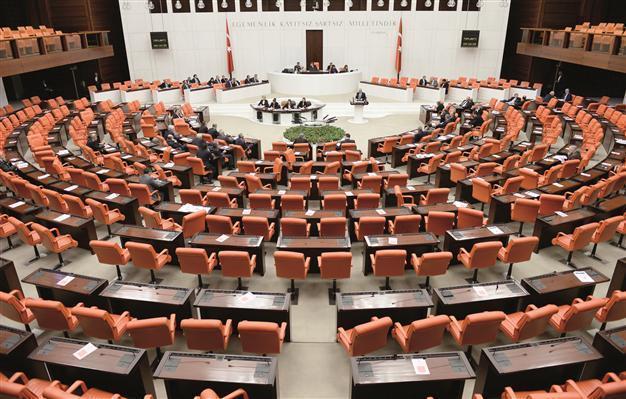Security bill delayed again as opposition vows to fight
Bülent Sarıoğlu ANKARA
 The debate on the government’s controversial security bill, scheduled to be held in parliament today after being postponed last week, has been delayed again, as the three opposition parties in the legislature plan to file motion after motion to stop the bill in its tracks.
The debate on the government’s controversial security bill, scheduled to be held in parliament today after being postponed last week, has been delayed again, as the three opposition parties in the legislature plan to file motion after motion to stop the bill in its tracks.Parliamentary debates of the draft law changing various articles of the laws on the authorities of the police and the gendermarie were to start today, but the ruling party announced yesterday that they will not start before at least another week. All three of the opposition parties at parliament have vowed to cooperate and “use all their rights” to prevent the bill from being passed.
The law, which consists of 132 articles, will be debated in five main sections, and the opposition parties have decided to use their motion rights on each of the articles, as well as other rights granted to them by parliament’s internal regulations. According to this strategy, after debates on the law, some 400 motions presented by the opposition parties will be discussed. The three parties will demand the full name of the bill, which comes to 130 words, be read at every motion discussion, meaning that debatingeach article will last at least 15 minutes.
After the debate on each article, three deputies who have filed the motion will have the right to talk for five minutes each about each one. The opposition deputies will also demand that the ruling Justice and Development Party (AKP) deputies are present at the General Assembly in order to reach the quorum.
However, before filing their motions, each of the opposition parties will claim that the bill is unconstitutional and open up debates on protocol. To extend the discussions even further, they will also demand that the discussion be held in a “closed” manner, thus extending the meeting times as confidential motions need to be discussed behind closed doors.
Main opposition Republican People’s Party (CHP) deputy Ali Serindağ said his party would use “every right the internal regulations and the constitution grants” and would be insistent on correction of those articles that are unconstitutional.
Meanwhile, Council of Europe Commissioner for Human Rights Nils Muiznieks has expressed his concerns and urged parliament to reconsider the bill, in a statement released on the commission’s official Facebook page on Feb. 9.
“The proposed bill seems to increase the powers of the police without reinforcing the necessary independent control over its actions,” read a part of Muiznieks’ statement.
“I think in particular that any widening of the powers of the police to use firearms, to use force during demonstrations, to stop and check, or to apprehend suspects at their own initiative without judicial authorization would bear the risk of increasing the likelihood of human rights violations with respect to the right to life, to freedom of assembly and to respect for private life,” he added.
Muiznieks urged the Turkish parliament to reconsider the new proposal “in light of the relevant international standards,” as well as the country’s own human rights bodies, in order to improve the Turkish police’s human rights record.
Peoples’ Democratic Party (HDP) Co-Chair Selahattin Demirtaş had urged on Feb. 3 the other two opposition parties, the CHP and the Nationalist Movement Party (MHP), to “block parliament” in order to prevent the voting on the security package.
“I address all opposition parties: Let’s join hands and block parliament. Let’s not allow this draft bill to become law for months. The opposition can achieve this if it cooperates,” Demirtaş had told his party deputies at parliament.
Parliamentary debates that were scheduled to begin on Feb. 4 were postponed to today due to the extension of debates on the draft mining law to Feb. 4, the government decided to push back debates on the security bill to this week.
Debates over the contentious security bill have recently triggered a bitter war of words between the ruling and the opposition parties. Main opposition CHP head Kemal Kılıçdaroğlu described it as a “clear provocation” on Feb. 5, in response to Prime Minister Ahmet Davutoğlu’s claim that Kılıçdaroğlu is a “provocateur” rather than a political leader.
“If you want to punish those who use weapons with a one-year sentence and those who use slings with two years, then you would be provoking the people and that would not be right. Eavesdropping on people and detaining people without a court decision are also wrong,” Kılıçdaroğlu said, referring to the scope of the bill.
















